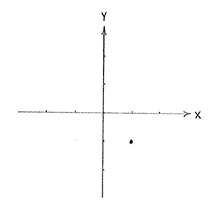Solution 4.1:7d
From Förberedande kurs i matematik 1
(Difference between revisions)
m |
|||
| Line 1: | Line 1: | ||
| - | We rewrite the equation in standard by completing the square for the x- and y-terms | + | We rewrite the equation in standard form by completing the square for the ''x''- and ''y''-terms, |
| - | + | ||
| - | + | ||
| - | + | ||
| - | + | ||
| - | + | ||
| - | + | ||
| + | {{Displayed math||<math>\begin{align} | ||
| + | x^{2} - 2x &= (x-1)^2 - 1^2\,,\\[5pt] | ||
| + | y^{2} + 2y &= (y+1)^2 - 1^2\,\textrm{.} | ||
| + | \end{align}</math>}} | ||
Now, the equation is | Now, the equation is | ||
| + | {{Displayed math||<math>\begin{align} | ||
| + | (x-1)^2 - 1 + (y+1)^2 - 1 &= -2\\ | ||
| + | \Leftrightarrow\quad (x-1)^2 + (y+1)^2 &= 0\,\textrm{.} | ||
| + | \end{align}</math>}} | ||
| - | <math> | + | The only point which satisfies this equation is <math>(x,y) = (1,-1)</math> because, for all other values of ''x'' and ''y'', the left-hand side is strictly positive and therefore not zero. |
| - | + | ||
| - | + | ||
| - | + | ||
| - | The only point which satisfies this equation is | ||
| - | <math>\left( x \right.,\left. y \right)=\left( 1 \right.,\left. -1 \right)</math> | ||
| - | because, for all other values of | ||
| - | <math>x</math> | ||
| - | and | ||
| - | <math>y</math> , the left-hand side is strictly positive and therefore not zero. | ||
| - | |||
| - | |||
| - | {{NAVCONTENT_START}} | ||
<center> [[Image:4_1_7_d.gif]] </center> | <center> [[Image:4_1_7_d.gif]] </center> | ||
| - | |||
| - | |||
| - | {{NAVCONTENT_STOP}} | ||
Current revision
We rewrite the equation in standard form by completing the square for the x- and y-terms,
| \displaystyle \begin{align}
x^{2} - 2x &= (x-1)^2 - 1^2\,,\\[5pt] y^{2} + 2y &= (y+1)^2 - 1^2\,\textrm{.} \end{align} |
Now, the equation is
| \displaystyle \begin{align}
(x-1)^2 - 1 + (y+1)^2 - 1 &= -2\\ \Leftrightarrow\quad (x-1)^2 + (y+1)^2 &= 0\,\textrm{.} \end{align} |
The only point which satisfies this equation is \displaystyle (x,y) = (1,-1) because, for all other values of x and y, the left-hand side is strictly positive and therefore not zero.

